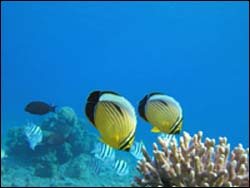Researchers from NASA’s Goddard Space Flight Center (GSFC) and several other government and academic institutions have created four new supercomputer simulations that for the first time combine their mathematical computer models of the atmosphere, ocean, land surface and sea ice. These simulations are the first field tests of the new Earth System Modeling Framework (ESMF), an innovative software system that promises to improve and accelerate U.S. predictive capability ranging from short-ter

About 13% of bacteria near the ocean’s surface contain proteorhodopsin, a membrane protein able to harness sunlight’s energy, according to a new study by Oded Beja and colleagues in the open-access journal PLoS Biology. Given the dearth of nutrients in their environment, these oligotrophic bacteria must generate their energy from a variety of sources. The study reveals that proteorhodopsin is uniquely suited to capturing the high-radiation sunlight that illuminates the sea. Through
The chance discovery of a vast ecosystem beneath the collapsed Larsen Ice Shelf will allow scientists to explore the uncharted life below Antarctica’s floating ice shelves and further probe the origins of life in extreme environments. Researchers discovered the sunless habitat after a recent underwater video study examining a deep glacial trough in the northwestern Weddell Sea following the sudden Larsen B shelf collapse in 2002.
“This is definitely the biggest thing I’

Scientists face difficult challenges in predicting and understanding how much our climate is changing. When it comes to gases that trap heat in our atmosphere, called greenhouse gases (GHGs), scientists typically look at how much of the gases exist in the atmosphere.
However, Drew Shindell, a climatologist at NASA’s Goddard Institute for Space Studies, New York, NY, believes we need to look at the GHGs when they are emitted at Earth’s surface, instead of looking at the GHGs themse
Mercury and DDT are 60X higher as a result of bird droppings, say researchers
Seabirds are the surprising culprits in delivering pollutants – through their guano – to seemingly pristine northern ecosystems, a new Canadian study shows.
The most common form of wildlife in the Arctic, seabirds are responsible for transporting most of the human-made contaminants to some coastal ecosystems, the researchers found. “The effect is to elevate concentrations of pollutants such a
Thanks to extensive GPS measurements and analyses by TU Delft and its scientific partners, unique images showing the development of the earthquake on 26 December 2004 in South East Asia have been created. This is the first time that a quake of such magnitude has been recorded and made visible using GPS. Today, Thursday 14 July 2005, an article on this subject will be published in the scientific journal Nature.
In the past few years, working together with French, Indonesian, Malaysia